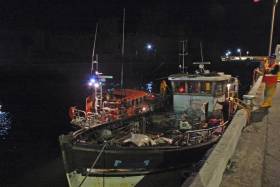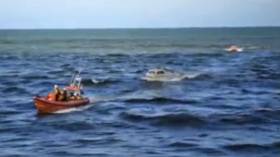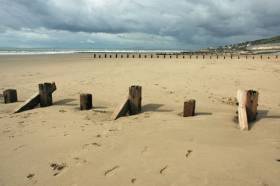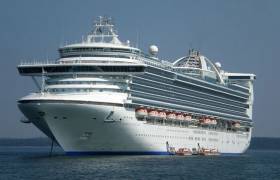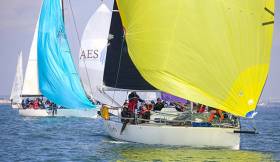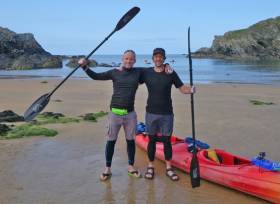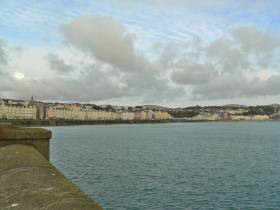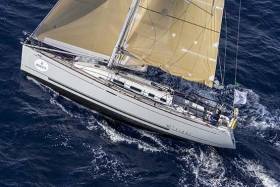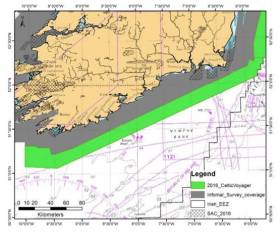Displaying items by tag: irish sea
Dramatic Rescue Of NI Trawler In Irish Sea Off Isle Of Man
#RNLI - Two British naval war ships, three helicopters and a fishing vessel joined Peel RNLI in the dramatic rescue of a trawler between Northern Ireland and the Isle of Man in the early hours of Wednesday morning (21 September).
The 20m converted fishing vessel from Kilkeel in Co Down was on passage in the Irish Sea from Glasgow to Conwy in Wales when it started taking water through the stern tube and was in danger of sinking some 11 miles west of the Isle of Man.
Peel's all-weather lifeboat Ruby Clery, under the command of coxswain Paul Cain, launched shortly after the volunteer crew were alerted at 1.30am.
Northern Irish fishing vessel Stephanie M gave shelter to the casualty until the lifeboat crew were able to put a pump on board to evacuate the water.
The vessel, with three adults and one child on board, was soon stabilised and helicopters and other vessels stood down. The trawler was then taken in tow by the lifeboat bound for Peel.
During this time, a young woman and the child were taken ill, so the tow was dropped about 15 minutes from Peel and the two taken to a waiting ambulance where they were treated and then removed to Nobles Hospital.
Meanwhile, the lifeboat returned to the stricken vessel, which was now under its own power, and escorted it into Peel Harbour at about 5am.
"We advise people to always check their equipment before leaving port," said Cain after the callout.
Man Dies After Two Go Overboard From Speedboat In Irish Sea
#IrishSea - A man has died after going overboard from a speedboat in the Irish Sea off Aberystwyth in West Wales yesterday morning (Wednesday 31 August).
Aberystwyth RNLI launched its Atlantic class lifeboat at 9.30am to reports of an empty speedboat circling in Cardigan Bay about 500m offshore.
The volunteer crew were swift to the scene to pull two men from the water into the safety of the lifeboat, and treatment of one of the casualties began immediately.
However, as Wales Online reports, despite the best efforts of rescuers, the man sadly died, while his companion was last reported in a stable condition at Bronglais Hospital.
HM Coastguard later assisted the lifeboat volunteers in their inshore rescue boat to gain control of the speedboat and bring it in to the marina.
#Missing - BBC News reports that the search has resumed for two teenagers missing in the Irish Sea off north-west Wales since yesterday afternoon (Sunday 7 August).
The two boys, ages 14 and 15, had got into difficulty while swimming at Barmouth Beach in Cardigan Bay and were separated from their group, comprising members of the Somali and Yemeni communities in Birmingham.
It's understood one member of the group attempted a rescue but was unsuccessful.
In a separate incident, HM Coastguard and RNLI lifeboats from Cardigan and New Quay launched to reports that a man had been swept off rocks at Mwnt on the southern side of Cardigan Bay.
It was reported that two men had been walking when they were cut off by the tide and one of them fell into the sea from rocks.
Power Failure Strands Cruise Liner In Irish Sea
#CruiseLiners - A power failure on board a large cruise liner rendered the vessel adrift in the Irish Sea for nine hours earlier this week, as The Irish Times reports.
The "technical glitch" on the Caribbean Princess cut power to the engines when the 290m liner was close to the shore off Wicklow on Wednesday (3 August).
The Grand Class cruise ship was en route to Dublin Port from Cobh where it made a stopover the previous day.
Once power was restored, the vessel proceeded to the Port of Belfast, skipping its scheduled stop in Dublin – which it last visited in May, as previously reported on Afloat.ie.
The Irish Times has more on the story HERE.
ISORA Boats Prepare for Race to Pwllheli
The next race in the AveryCrest ISORA 2016 series is the race from Dun Laoghaire to Pwllheli this Saturday.
The race is also the feeder race for the Spinlock IRC Welsh National Championships in Pwllheli from August 12 to 14th. The 80 miler starts at 0800hrs from Dun Laoghaire harbour.
Due to the total lack of winds forecast in the Irish Sea around Dublin and the strong tides, tonight’s ISORA Night Race from Dun Laoghaire has been postponed until 20.00 on Friday 19th August.
The decision was taken by the ISORA Sailing Committee after referring to the Skippers of all entered boats.
For those boats who have entered the race and who cannot take on the rescheduled race, their entry fee can be transferred to any of the remaining races in the ISORA Series 2016, according to ISORA chair Peter Ryan.
#Kayaking - Despite only learning how to swim last year, Manchester man Alan Creedon took up the challenge of paddling across the Irish Sea in honour of his late sister.
And this week he achieved just that, when he and his much more experienced kayaking partner Mike Alexander reached land at Dun Laoghaire by sea kayak after a 22-hour crossing from Holyhead.
According to The Irish Post, Creedon's journey actually began earlier this month when he set off on foot from his Manchester home for the North Wales ferry port – a journey of nearly 200km.
But the journey's not over yet, as Creedon's #WalkForAoife as he prepares to continue by foot across Ireland to Dingle, where his Irish family are based.
Along the way he'll continue to recount his experiences on his blog where he's also fundraising for a Dingle housing charity as well as mental health support.
In other kayaking news, island communities in West Cork are set to benefit from a kayak-sharing scheme modelled along the lines of bike-sharing in Irish cities.
As the Irish Examiner reports, Whiddy Island will host a test of the scheme next week before it's rolled out to Cape Clear, Long, Heir, Dursey and Sherkin Islands over the next three years.
Open Verdict On Death Of Polish Woman Recovered From Irish Sea
#IrishSea - The inquest into the death of a Polish woman from Dublin whose body was recovered from the water off the Isle of Man last summer has recorded an open verdict, as BBC News reports.
Recording his findings at Douglas Courthouse earlier this month, coroner John Needham said 33-year-old company director Joanna Dabrowska had likely "spent a significant period" of "several weeks" in the Irish Sea before members of the public recovered her body in Douglas Bay on 5 July 2015.
Dabrowska has been renting a flat in Dublin on a career break after a stint in Germany when she was reported missing by her landlord in early June.
"Police enquiries have thrown no light on how, where and when Joanna's body entered the sea but there was no disease and no traumatic injuries to the skull," said Needham, adding that the date of her death would have been some time between 27 May and 25 June 2015.
BBC News has more on the story HERE.
ISORA Adds Double–Handed Class to 2016 Offshore Series
The Irish Sea Offshore Racing Association (ISORA) has introduced short handed sailing to the Irish Sea offshore game this season, a recognition for the Irish boats acheiving success in the discipline on the international stage over the last few seasons.
Although ISORA has always encouraged short-handed racing (it accommodates single handed racing in its day races) the 2016 initative from Commodore Peter Ryan goes a step further with the new double handed class open to any boat sailed double handed for any of the ISORA races.
Reflecting the drive of the individual for the love of offshore sailing and noting Irish short–handed wins in the 2015 Middle Sea Race and the Round Britain and Ireland Race two years ago, it will be ineresting to see the take up for the new class on either side of the Irish Sea.
The Double Handed Overall Class winner will be determined by the best four Double Handed results for that boat. Race prizes for Double Handed will be allocated depending on the number of boats taking part in the race. Double Handed boats will also qualify for the normal Overall and Class prizes.
The first race in the Avery Crest ISORA Offshore Series 2016 takes place on the 23rd April with the day race from Dun Laoghaire to Wicklow.
As the first race of the season it is anticipated that the selected course will allow boats and crew to ease into the 2016 season while having enough time after the race to sample the hospitality of Wicklow Sailing Club while waiting for the north going tide.
The second race of the Offshore Series 2016 is the Pwllheli Bay Day Race also on 23rd April. This race will take the fleet along the scenic Welsh Coastline and out into the spectacular and World renowned sailing waters of Cardigan Bay. After racing the crews will retire to the new Sailing Club in the iconic Academy where there will be opportunities to discuss the 2016 offshore campaigns and the challenge to retain the ISORA Team Trophy again this year.
This sailing season’s highlight is the Volvo Round Ireland Race and it is hoped that this will encourage those boats taking part to gain the required experience and practice in offshore racing by taking part in ISORA.
As Afloat previously reported, this season sees some new boats entering: Kuba Szymanski’s First 40.7. Grant Kinsman’s Sigma 400 and Robert Floate’s Sydney 36 should make some competitive racing for the Class 1. George Sisk’s, ICRA 2015 Boat of the Year and overall winner of the Volvo Dun Laoghaire Regatta, “WOW” is back racing in ISORA. There are persistent rumours of a JPK 10.8 appearing and a J105 from Wales?
Marine Notice: Hydrographic & Geophysical Survey Off Mayo Coast, Celtic Sea & Irish Sea
#MarineNotice - The latest Marine Notice from the Department of Transport, Tourism and Sport (DTTAS) has been advised that a hydrographic and geophysical survey operation will be undertaken by INFOMAR for the Sustainable Energy Authority of Ireland (SEAI) off the Mayo coast, in the Celtic Sea and also in the Irish Sea between 21 March and 30 October 2016.
The RV Celtic Voyager (Callsign EIQN), the RV Celtic Explorer (Callsign EIGB), the RV Keary (Callsign EIGO9), the RV Geo (Callsign EIDK6) and the RV Tonn (Callsign: EIPT7) are expected to carry out survey operations and will be listening on VHF Channel 16 throughout the project.
Details of co-ordinates for the survey operations are included in Marine Notice No 11 of 2016, a PDF of which is available to read or download HERE.


























